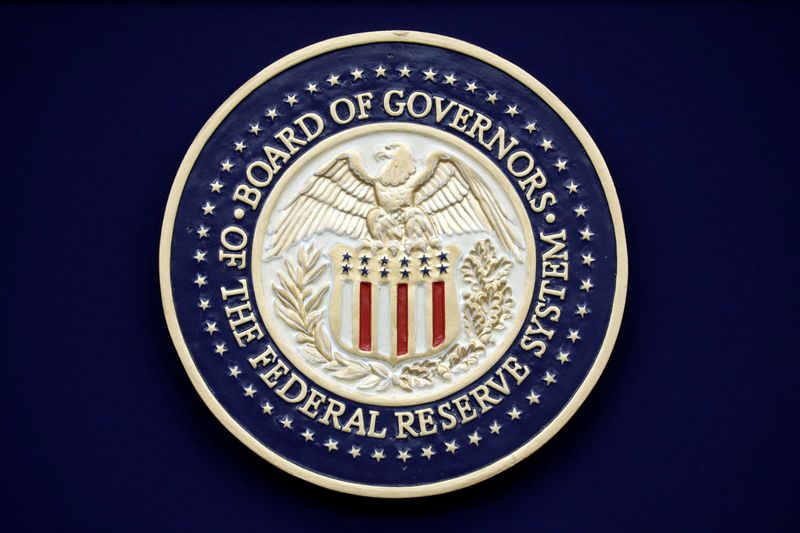
- All Instrument Types
- Indices
- Equities
- ETFs
- Funds
- Commodities
- Currencies
- Crypto
- Bonds
- Certificates
Please try another search

Off the 'QT': Does Fed nominee Judy Shelton have a balance sheet problem?
 © Reuters. Jerome Powell holds a news conference in Washington
© Reuters. Jerome Powell holds a news conference in Washington
WASHINGTON (Reuters) - As an outside critic of the Federal Reserve, conservative economist Judy Shelton has slammed the central bank's massive $4.2 trillion balance sheet as distorting financial markets and "largely benefiting people who have hefty stock-market portfolios."
It is also an entrenched part of how the Fed manages interest rates, and has been endorsed by Shelton's patron, President Donald Trump, who regularly trumpets stock market gains as proof his policies are working, slammed the Fed when it tried to scale back its asset holdings, and suggested the Fed's hoard of bonds get even bigger.
When she appears at a Senate confirmation hearing on Thursday, Shelton may face a tough grilling on issues from financial regulation - her PhD thesis suggests bank deposit insurance isn't in theory necessary in free capital markets - to whether she supports the gold standard.
But how Shelton answers questions about the Fed's balance sheet could offer a front-and-center clue about whether she would try to shake things up at the Fed, or meld into a consensus that, for the moment, is giving Trump a stable economy and record stock prices during his reelection year.
"QT" - or "quantitative tightening" - may be what Shelton feels the Fed needs in theory to fit her view that central banks should narrowly focus on keeping the value of money stable. But it could also upend the very markets Trump wants to keep elevated.
Ed al-Hussainy, a senior analyst at Columbia Threadneedle Investments, predicted Shelton's calls for the Fed to scrap its current method of managing interest rates and move to a smaller balance sheet would fade if she gets the job. "That line of thinking will evaporate," he said.
Other iconoclasts have joined the Fed's board over the years, only to find their arguments challenged by data, longstanding practice, and an institutional structure that centralizes influence around the chair but also incorporates diverse views from 12 far-flung regional banks.
“We’ve had plenty of dissent at the Fed over the years,” Fed chair Jerome Powell said on Wednesday in response to questions from a Republican senator during testimony to Congress. “It just makes you stronger.”
TRUMP'S PICKS
Shelton is one of two names Trump put forward to fill a pair of vacancies on the Fed's seven-member Board of Governors. The other is St. Louis Federal Reserve Bank research director Christopher Waller.
Both have doctorates, Shelton's in business administration from the University of Utah and Waller's in economics from Washington State University. Shelton has been a fixture of the conservative think tank and advocacy world, including a decade at the Hoover Institution, while Waller has been in academia and at the St. Louis Fed since 2009.
It is Shelton's nomination, however, that has raised eyebrows.
An adviser to Trump's 2016 campaign and member of his transition team, she has already successfully navigated one Senate confirmation process - as Trump's appointee to be U.S. director of the European Bank for Reconstruction and Development.
Senator Elizabeth Warren, the Massachusetts Democrat also running for president, raised "significant concerns" about Shelton's nomination in a letter to her last month and asked for written responses by Thursday to a series of questions on Shelton's views about the Fed, central banking and financial regulation.
Shelton did not respond to Reuters' requests for an interview.
MONEY FOR NOTHING
One of Shelton's main objections to the Fed's current framework is it pays interest to banks on the reserves they deposit at the Fed. Those payments are an offshoot of the extraordinary measures the Fed took to combat the financial crisis, which also permanently changed how it conducts policy.
Shelton has criticized the new regime, which requires the Fed to maintain a large balance sheet to keep the banking system flush with "ample reserves" and to keep short-term interest rates near its target. She has contended it provides a disincentive for banks to make loans - and support the economy - because they can earn money from the Fed by effectively taking no risk at all.
"It's like paying the banks to do nothing," she said in a New York Times interview in May.
Indeed on that point she and Warren may agree. Warren and other Democrats have also questioned the Fed's use of interest on reserves and other tools they feel favor large financial institutions.
But it's unclear what alternative Shelton could offer that wouldn't risk roiling financial markets were trillions of dollars to be drained from the system.
"It would be disruptive," said Vincent Reinhart, chief economist at BNY Mellon. "If the Fed were to make a transition from ample reserves...it would be very bumpy."
The Fed already was confronted with a taste of such upheaval last fall when it allowed reserves to grow too scarce and money markets briefly went haywire, forcing the Fed to start increasing its balance sheet again.
It may have been more of the market manipulation Shelton has criticized, but stock prices have risen steadily since then - as Trump has noted.
Meanwhile, Waller - the other board nominee - has no beef with the Fed's large balance sheet.
"A lot of people are like we just want to go back," to a smaller balance sheet, Waller said in a 2018 interview with Reuters.
"Well, hell no," he said. "Things have changed since 2007."
Related Articles
Are you sure you want to block %USER_NAME%?
By doing so, you and %USER_NAME% will not be able to see any of each other's Investing.com's posts.
%USER_NAME% was successfully added to your Block List
Since you’ve just unblocked this person, you must wait 48 hours before renewing the block.
I feel that this comment is:
Thank You!
Your report has been sent to our moderators for review



Add a Comment
We encourage you to use comments to engage with other users, share your perspective and ask questions of authors and each other. However, in order to maintain the high level of discourse we’ve all come to value and expect, please keep the following criteria in mind:
Enrich the conversation, don’t trash it.
Stay focused and on track. Only post material that’s relevant to the topic being discussed.
Be respectful. Even negative opinions can be framed positively and diplomatically. Avoid profanity, slander or personal attacks directed at an author or another user. Racism, sexism and other forms of discrimination will not be tolerated.
Perpetrators of spam or abuse will be deleted from the site and prohibited from future registration at Investing.com’s discretion.